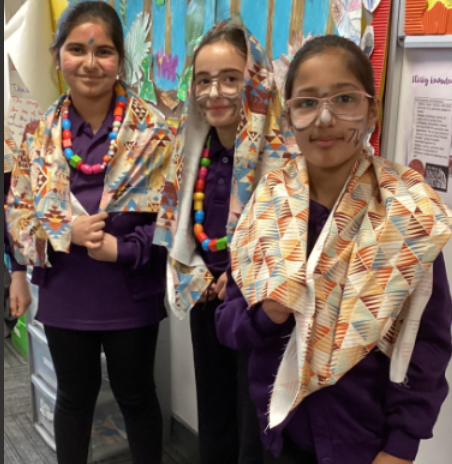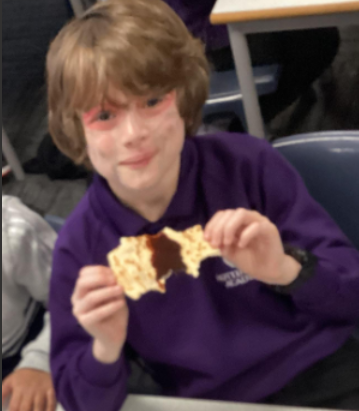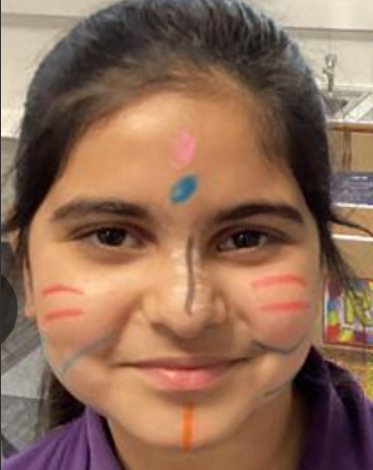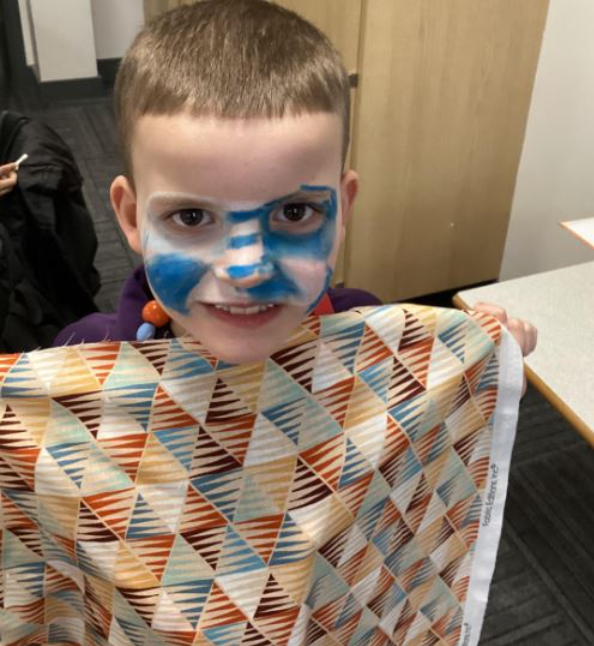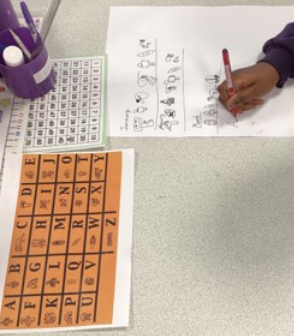History
Intent
Our history curriculum has been designed for all pupils at Nottingham Academy to access a broad, balanced and enriching history curriculum. Our history curriculum stimulates the children’s interest, curiosity and understanding about the past. Through our progressive curriculum, pupils will gain a knowledge and understanding of Britain’s past and that of the wider world. We teach pupils a sense of chronology and through this they develop a sense of identity and an awareness of the challenges of their time. Teaching of progressive skills, equips children to ask questions, think critically, weigh evidence and develop perspective and judgement, integrating both substantive and disciplinary skills. History teaching will help pupils to understand the complexity of their lives, the process of change and the diversity of society.
Implementation
Substantive and disciplinary knowledge:
Substantive knowledge in history refers to the knowledge (facts) pupils gain about the past. This will be specific to the period they are studying. However, substantive knowledge also includes historical concepts, which are abstract terms such as empire, architecture and monarchy. Historical concepts not only help children to make sense of their historical period of study, but they also provide a proximal role in helping them to make connections across different periods. Both of these have been carefully considered and mapped out within our curriculum design. They can be found within our progression documents, sticky knowledge and historical concept map below.
Disciplinary knowledge in history is centred on the way that sources provide us with evidence that is used to construct interpretations of the past. We provide high-quality teaching and learning in history, which includes a core focus on the use of a range of sources (such as documents, artefacts, images, maps, video footage and buildings). Our focus is also on second-order concepts, such as causation, significance, consequence, continuity & change and similarity & difference; these are important in order to develop pupils’ critical thinking and their understanding of the processes and relationships between the different events they study. These are carefully mapped out in detail within our progression documents.
Curriculum design:
We have carefully selected significant time periods and people to study within our history curriculum. Although these are not taught in chronological order, children have a good understanding of where periods sit on a timeline through our bespoke Nottingham Academy History curriculum timeline, which plots the eras and significant people we study. This is shared at the beginning of history units in order for children to develop an understanding of chronological order and to support building on what they already know, as well as develop curiosity about what's to come within their primary history journey. The link for this can be found below.
Key historical concepts have been chosen within our curriculum design in order for children to make links between historical periods to deepen their conceptual understanding. For example, children will learn about the concept of 'Invasion' through studying the Roman Empire, the Anglo-Saxons, Mayans and Aztecs, the Vikings, the British Empire and WW2. Their understanding of this key concept will grow and deepen as they explore 'Invasion' within each time period.
Cross-curricular links
Our curriculum is designed to make relevant and purposeful cross-curricular links to encourage children to apply their knowledge within history. History is one of our topic drivers, where linked texts are carefully selected to use in English and guided reading lessons. Links are also made across other subjects, including creating dinosaur fossils, Viking long-boats and Aztec printing in art and making Mayan tortillas and Roman shield design and technology.
Sequence of learning:
Teachers plan a sequence of learning within history following the structure below:
 LINK IT! Using our school progression documents and historical concept documentation, teachers consider links to prior learning in order for children to build on what they already know.
LINK IT! Using our school progression documents and historical concept documentation, teachers consider links to prior learning in order for children to build on what they already know.
![]() LEARN IT! Teachers plan and deliver engaging and meaningful learning opportunities with explicit teacher modelling, opportunities for children to talk, ask questions, debate and practice historical enquiry skills through their interaction with a variety of sources.
LEARN IT! Teachers plan and deliver engaging and meaningful learning opportunities with explicit teacher modelling, opportunities for children to talk, ask questions, debate and practice historical enquiry skills through their interaction with a variety of sources.
 CHECK IT! Teachers plan for opportunities to review and check learning each lesson to ensure adaptations can be made to the next lesson.
CHECK IT! Teachers plan for opportunities to review and check learning each lesson to ensure adaptations can be made to the next lesson.
 SHOW IT! At the end of a unit of work, children will have produced a piece of work which showcases their learning. 'Show it' pieces of work may include a whole class performance for parents, hot seating, a whole class debate, a diary entry from a significant historical person or a newpaper report.
SHOW IT! At the end of a unit of work, children will have produced a piece of work which showcases their learning. 'Show it' pieces of work may include a whole class performance for parents, hot seating, a whole class debate, a diary entry from a significant historical person or a newpaper report.
![]() KNOW IT! A short Sticky Knowledge quiz allows the children to demonstrate what they know and remember from their unit of work. These assessments are used to inform teacher judgements.
KNOW IT! A short Sticky Knowledge quiz allows the children to demonstrate what they know and remember from their unit of work. These assessments are used to inform teacher judgements.
Sticky Knowledge
For each history unit of work, we have compiled 'Sticky Knowledge' sheets, which essentially show what we want our children to know and remember at the end of each topic. The key substantive knowledge identified will form the basis of our retrieval practice for each lesson, so that through regular opportunities to revisit knowledge, it will become embedded in the children's long-term memory. Sticky knowledge is progressive and allows children to build on prior learning. Below are the links for the Sticky Knowledge identified for each year group in history.
Impact
- Teacher assessments demonstrate that children are make good progress in history.
- Our children demonstrate enthusiasm for the subject and can talk with confidence about their learning.
- Our children demonstrate an understanding of a range of historical vocabulary which can be applied confidently.
- As historians, our children can use their skills to pose questions, make comparisons, evaluate evidence and draw conclusions.
- Our children enjoy a range of history-enrichment opportunities which allow them to become immersed in the subject and encourages a genuine interest in historical topics.
Here are our children in year 3 enjoying their learning during our Egyptian day:
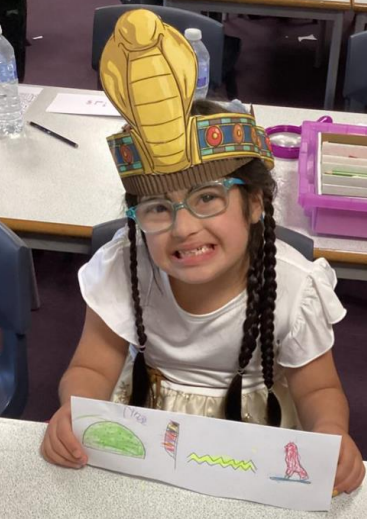
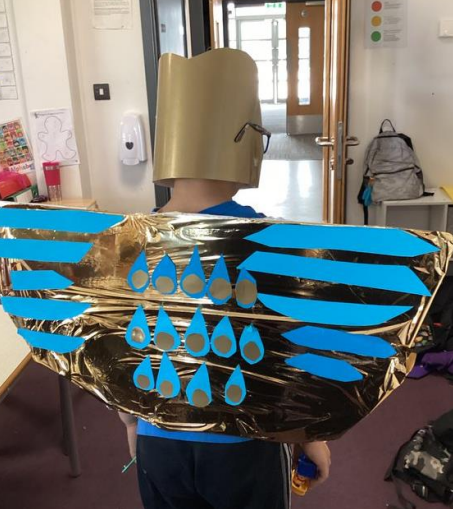
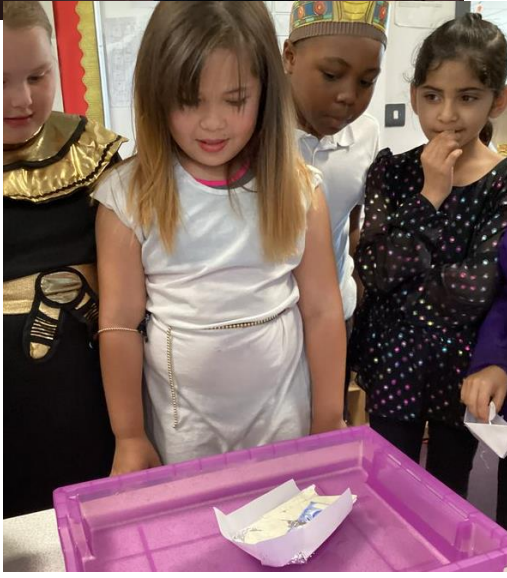
Here are some fabulous 'show it' pieces of work produced by our year 5 children in History to showcase their learning on The Vikings. We are proud of the exceptional presentation and excellent knowledge demonstrated around Vikings:
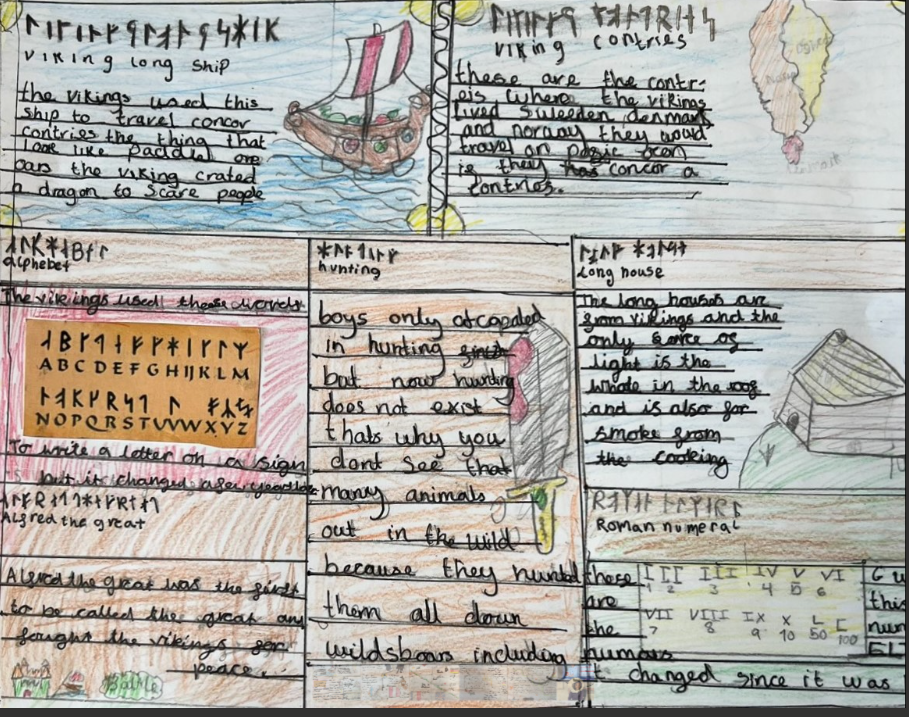
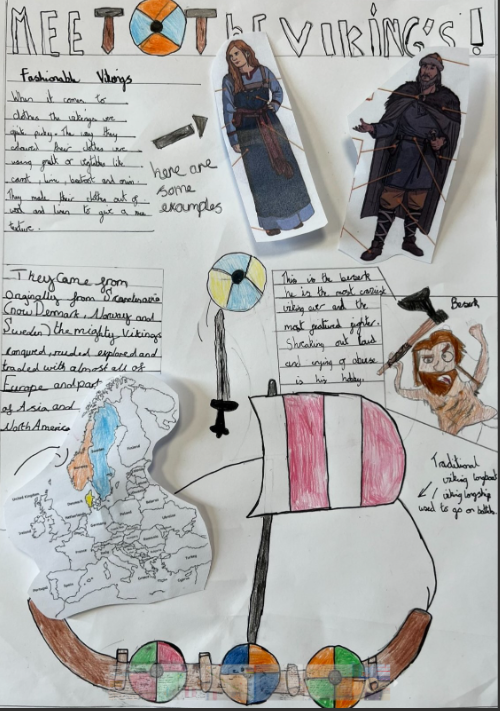
Our Year 6 children have produced some detailed and well presented timelines to showcase their knowledge of WW2. They have taken great pride in their work:
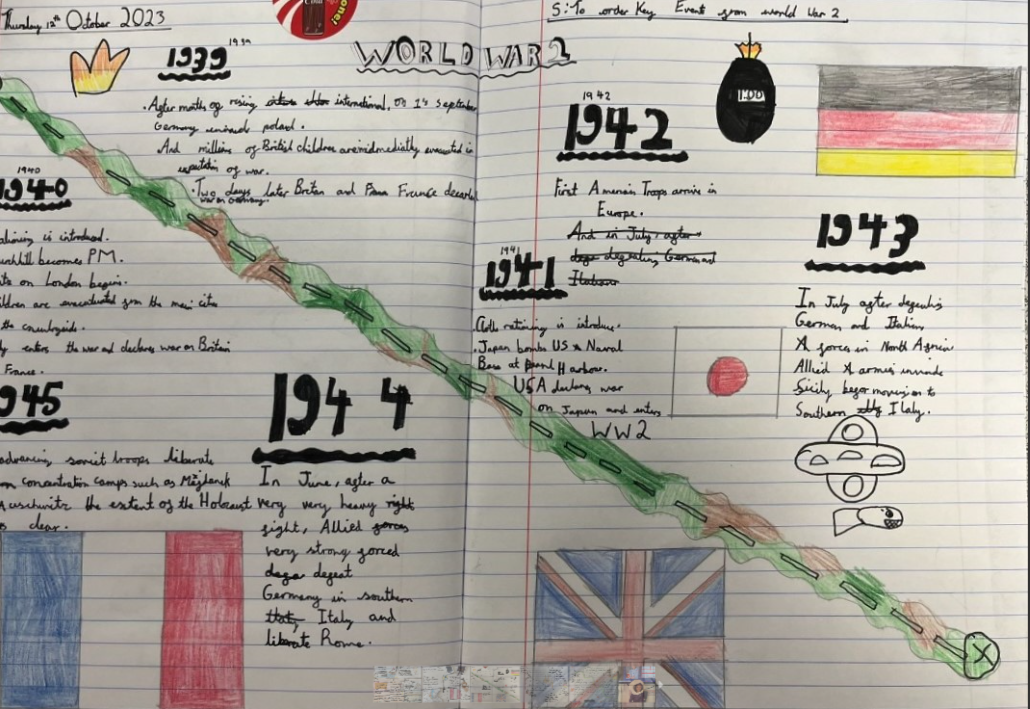
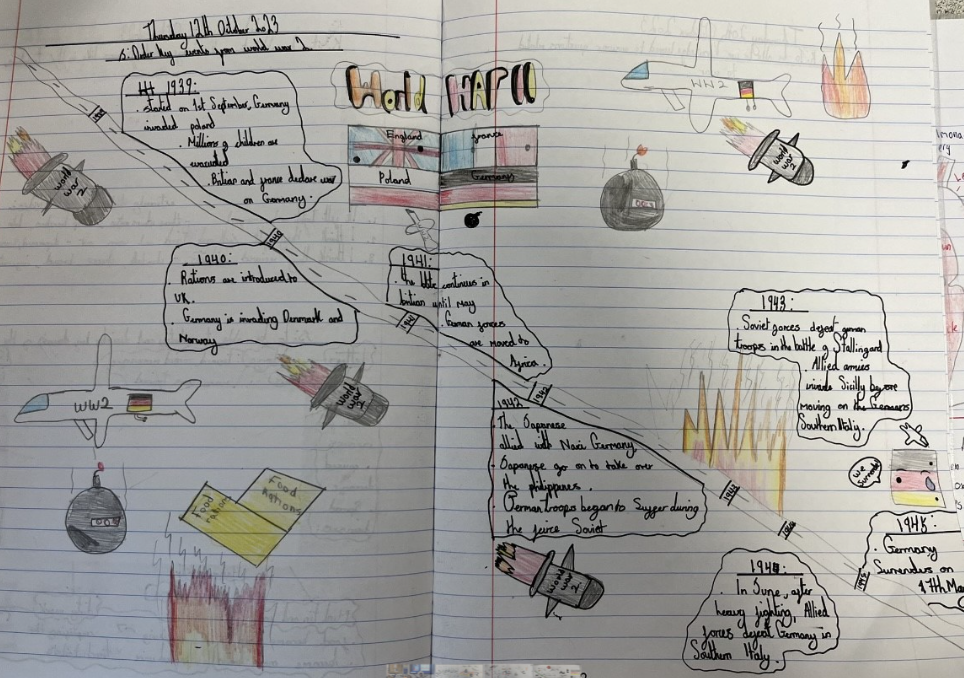
Year 2 children displayed an incredible amount of knowledge during their showcase 'hot seating' lesson.
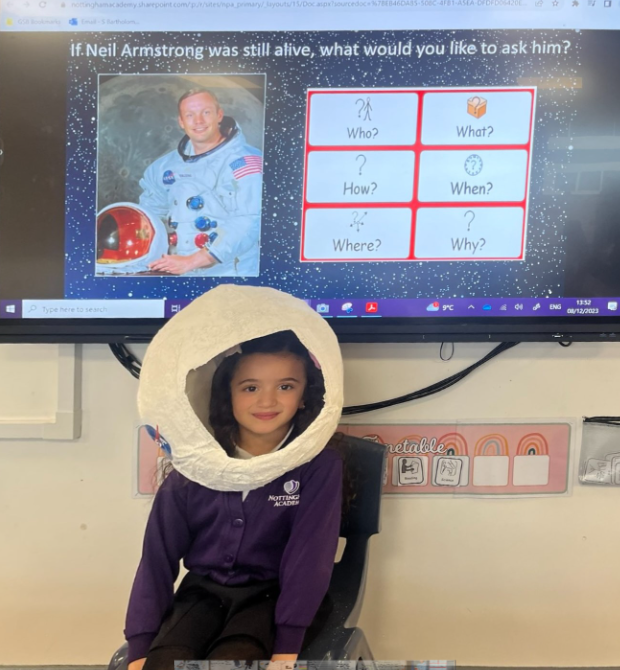
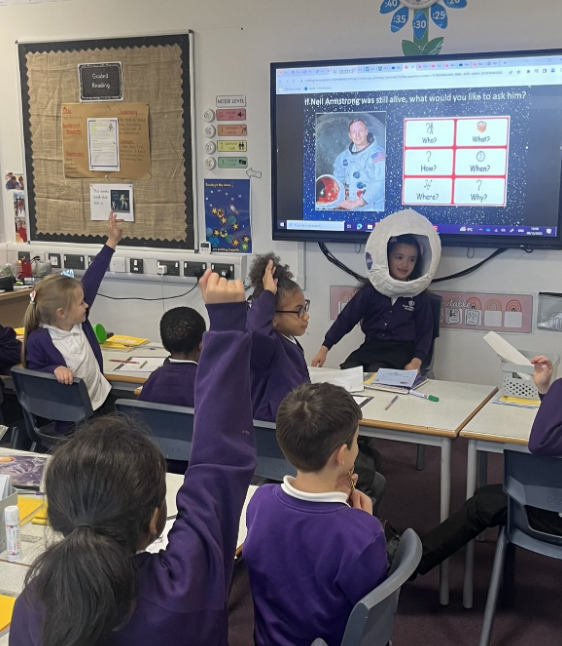
Children in year 3 have produced some excellent Stone-Age jewellery during their Design and Technology lessons:
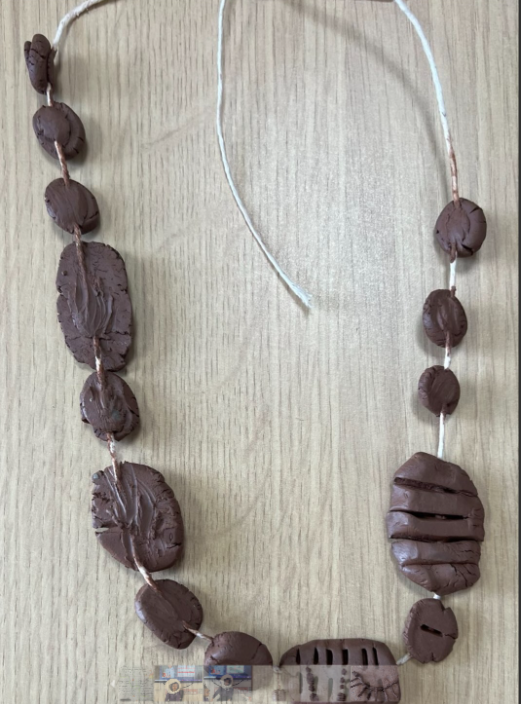
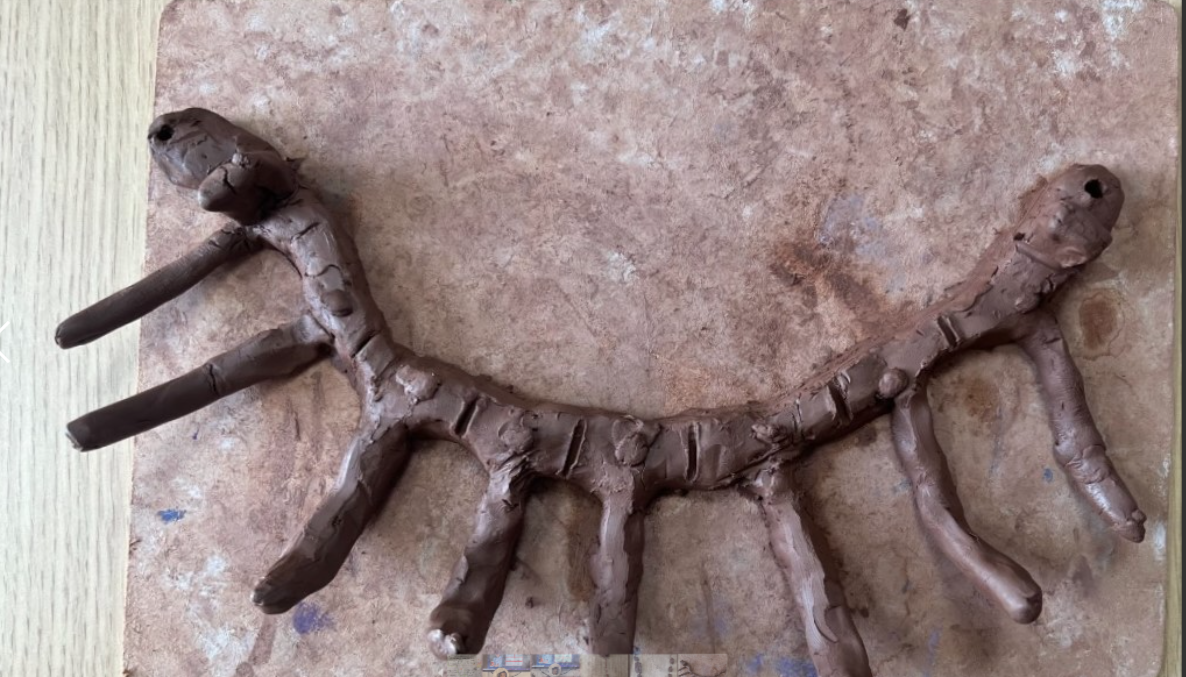
Year 4 celebrated the end of the half-term with a Mayan and Aztec day, filled with lots of fun activities to further their learning of these Ancient civilisations. The children worked together to create class Aztec calendars using the Aztec writing and number system. They worked in small groups to give a friend a 'glow up' to look like a Mayan Noble member of society, using face paint, creating jewellery, headdresses and clothes. Finally, they also tasted some traditional Mayan food, including their own tortillas that they created earlier in the week in their Food DT lesson.
